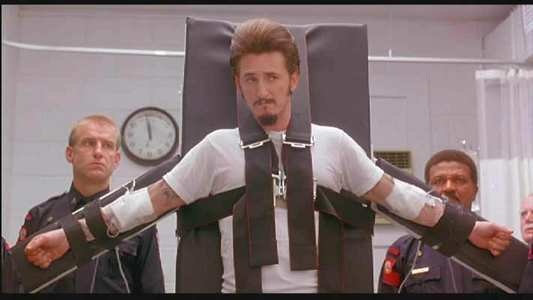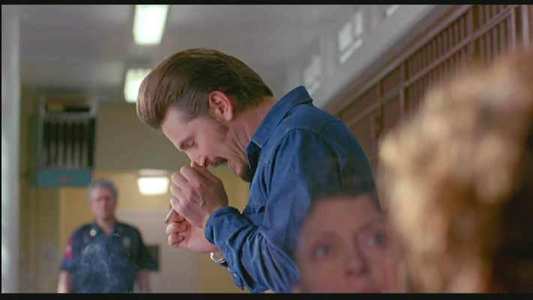Review of Dead Man Walking
Introduction
“An eye for an eye.”
Does that Old Testament edict have any validity in today’s society? Is state-sanctioned killing as wrong as that of a murderer taking an innocent life? Is the death penalty an abomination, or an appropriate punishment an effective deterrent?
Over the years these questions have troubled many. Actor/Director Tim Robbins is one of those and, in Dead Man Walking, he explores the issues.
Matthew Poncelet (Sean Penn) is sitting on death row convicted of murdering a young couple. Sister Helen Prejean (Susan Sarandon) is working with under-privileged children in a poor black neighbourhood. She gets a letter from Matthew, asking her to come to the prison and provide some companionship (and, of course, help him escape the death penalty). Sister Helen is uncertain, having never done anything like this before, but complies.
It becomes quickly apparent that Poncelet is not a very nice man. In fact he is a ball of racism, bitterness and hatred. There is some doubt as to whether he actually committed the murders but there is no doubt that he was an accomplice. Sister Helen sees something in Poncelet – maybe the vague possibility of redemption – and she works tirelessly on his behalf. Firstly to appeal the death sentence and, when that fails and it is certain that Poncelet will be executed, as his spiritual advisor and companion.
The decision to work with Poncelet causes Sister Helen some difficulties. Poncelet is an outspoken racist and this causes trouble back in the Louisiana projects. Also, the parents of the murdered couple attack her for siding with a murderer. However, Sister Helen knows that she is doing the right thing – that her duty as a nun is to work for the sinner’s redemption as much as the victim’s comfort.
This is no “will they be able to get a pardon for an innocent man in time” thriller. Poncelet isn’t an innocent man – he is a thoroughly nasty piece of work and many would say that he deserves what he is getting. Possibly. That’s the point.
Dead Man Walking is a considered and (as far as possible) balanced look at the death penalty through the eyes of a liberal Christian, Sister Helen. It should be noted that this is based on the memoirs of the real Sister Helen Prejean and thus is given an extra layer of poignancy.

Video
Presented in a 16:9 anamorphic transfer, Dead Man Walking looks great. There are no flaws or digital artefacts in evidence. Colours are rich and the image is nicely detailed.
For someone who is an actor by trade, director Tim Robbins has a remarkable gift for staging scenes and choosing just the right camera angle. Thus, while there are few overtly flashy scenes (this would detract from the message), the imagery is always impressive. For example, as Poncelet sits in calm anguish behind a glass barrier, we see Sister Helen’s reaction reflected in the glass.

Audio
There is little of aural interest in Dead Man Walking other than the dialogue and some music. Fortunately, both are pristinely presented.
The dialogue is crisp and clear. The music, by the likes of Bruce Springsteen, Eddie Vedder and Nusrat Fateh Ali Khan is simultaneously bleak and uplifting.

Features
Aside from a couple of trailers, the only feature present is a commentary by Tim Robbins. This is a detailed look at the background and the making of the film, but is less interesting that it could have been due to the soporific delivery of Robbins. Robbins speaks in a slow monotone and sounds as if he is on the brink of dropping off to sleep. Him and us both. It is worth persevering with but it’s quite hard work.

Conclusion
Dead Man Walking is an easy movie to watch. A gripping script, excellent direction and, above all, compulsive performances make sure of that. However, when it comes to the issue of the death penalty, it doesn’t provide any easy answers. In fact, in many ways, it tries not provide any answers at all. Robbins satisfies himself by presenting the various arguments in as fair and as balanced a way as he possibly can.
He shows us the anguish of the victims and their families and allows us to understand (if not necessarily condone) their need for some retribution or justice, as they see it. He also shows us the family of the convicted criminal and the way in which this whole system hurts and abuses them. Most importantly, he gives this an insight into the execution process. This is presented in a calm and dispassionate fashion and is all the more effective for it.
Throughout the film, I was aware that Robbins (who is a well known liberal activist) wanted me to decide that the death penalty was inhuman and unconscionable. But, Robbins doesn’t hector or berate; it is ultimately my and your decision.
Setting aside the big issue, Dead Man Walking is an excellent piece of cinema. Aside from Sister Helen Prejean’s original memoirs and Robbin’s direction, the main credit for this must go to the performances of Sarandon and Penn. They are both superb. Penn is compelling as the unsympathetic Poncelet and credit is due to him for taking such a thankless role. He is, by turns, arrogant and vunerable and his final scenes are among the best by any actor in any film. It should have been an Oscar winning performance but the role itself rather scuppered that.
Sarandon fared better and won an Oscar. This was no less than she deserved because her performance was equally excellent. She plays the role of the liberal nun to perfection and imbues it with an intelligence and compassion that is appropriately spiritual.
As a DVD, this is adequate. As a film, it is a must see.
Your Opinions and Comments
Be the first to post a comment!